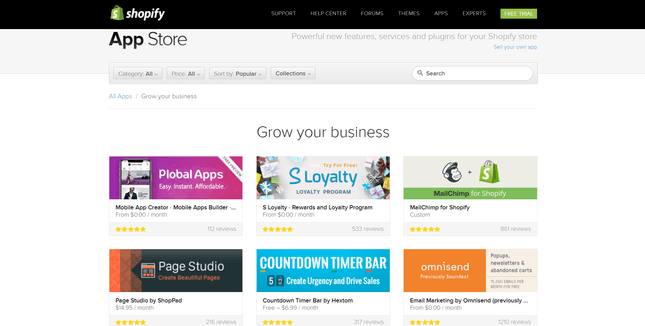The battle between Magento and Shopify is a typical one. Both are major eCommerce players. Their business methods, pricing structures and programming languages are all somewhat distinct.
It’s critical to pick the correct eCommerce platform when beginning a business. It’s a pain to pick the wrong platform only to have to scale back a few weeks later — time and money wasted.
If you find yourself split between Magento or Shopify, don’t worry! We’ll examine the advantages and disadvantages of each platform and assist you in selecting the best technology for your eCommerce business. Let’s dive right in.
Shopify
Shopify is a hosted eCommerce platform. You wouldn’t have to worry about hosting costs or technicalities. It’s ideal for online companies, particularly drop shipping, and small businesses that rely on social media promotion.
Shopify is easy to use for beginners. The dashboard is simple to use, store creation is simple, and you can drag and drop pieces to create your business. Give yourself a weekend or a few hours, and you’ll be ready to go. Shopify may be a better fit for you if you own a small business and plan to do the majority of the optimization and day-to-day operations yourself.
Magento
Magento is an open-source platform. It’s a strong tool for customizing your store, and you may create a finished product that stands out from the crowd. There are no limits to what you can accomplish as long as you have the necessary skills.
It’s also a self-hosted eCommerce platform that many huge brands use.
Magento is also excellent for SEO. Stick with Shopify if you’re only selling a few items or don’t have much technical knowledge. Few beginners can walk into a Magento store and start working right away; you’ll need to spend some time learning how to use it.
Magento vs Shopify: Pros and Cons

Ease of Use
If you choose a platform that is too difficult to use, you will be unable to construct the eCommerce store you desire, which could be harmful to your brand’s image and user experience.
It’s a given fact that Shopify is significantly more user-friendly than Magento. Shopify is a drag-and-drop website builder that allows you to easily personalize your store by dragging and dropping objects across the page.
In essence, Shopify is designed for users of various technical skill levels, whereas Magento is designed exclusively for web developers.
In comparison to Shopify, the learning curve for Magento is quite steep. To establish the internet store you desire, you’ll need to understand the programming language and use code or hire a web developer to do it for you.
Verdict from Digilite
Magento is more difficult to use than Shopify. Magento is more flexible than Shopify in that it allows you to personalize your site with code, but it’s also far more difficult to use, making it challenging for most users to create a store they are satisfied with.
SEO (Search Engine Optimization)
SEO aids in increasing the volume of search engine traffic to your website, resulting in more paying clients.
Magento excels at SEO and includes a plethora of SEO guidelines and prompts to get you started. You can change image alt tags (which Google uses to figure out how to categorize an image on the image search platform) and URLs to make it easier for search engine users to find your web pages. All of these features are also built-in.
Shopify, on the other hand, is more reliant on applications for SEO. While you can change page titles and picture alt tags, most of your SEO tactics will have to be in the app store.
Verdict from Digilite
In terms of SEO, Magento takes the lead over Shopify. It comes with a broader set of SEO tools, including SEO prompts and the option to change URLs. Many of your SEO wants and demands will require you to look for and install apps using Shopify.
Sales Tools
E-commerce platforms and sales tools are inextricably linked. Is it true that you can’t have one without the other? Let’s have a look at what’s under the hood of Shopify and Magento.
The following are some of Shopify’s top features for selling things and making money:
- Recovery of abandoned carts — recover potentially lost sales by sending automated emails to clients who left your website without completing a purchase.
- Multi-channel selling — a built-in function that allows you to sell on Amazon, Facebook, Pinterest, and Instagram.
- Sell digital products (as well as physical ones).
- Partnerships with USPS, DHL Express, UPS, and Canada Post — to save you the time and effort of looking for your own courier service.
Magento’s inventory system may really wow you, with capabilities to link bulk product import from your database, various product versions, total revenue reports, and total visitor count integrated into it.
Here are some of Magento’s best sales tools:
- Install extensions to integrate your store with Facebook, Instagram, and eBay for multi-channel selling.
- Customize your checkout — construct a one-of-a-kind checkout for your online store.
- Recovering abandoned carts
- Fixed-price and fixed—percentage discounts
Verdict from Digilite

Shopify offers a larger selection of sales tools than Magento. Shopify is one of the greatest eCommerce systems accessible, with several built-in features such as multichannel selling, which is only available through Magento’s paid extensions.
Marketing Features
Having access to effective marketing tools should assist your company in attracting new consumers and increasing profits. What’s not to like about that?
Shopify has excellent marketing options, including the ability to send email campaigns via third-party integrations with Seguno, Klaviyo, Constant, Contact, and other companies. You can also use Facebook, Instagram, and Pinterest to advertise and sell directly. We also like Shopify’s multilingual capability, which allows you to offer things in multiple languages.
Magento, on the other hand, relies heavily on its Marketplace for the majority of its marketing tools. To launch an email campaign, for example, you’ll need to install extensions like Remarkety. Furthermore, if you want really bespoke features, you’ll almost certainly need the services of a web developer to connect your marketing tools, whereas Shopify has plenty of built-in marketing tools to assist you.
Verdict from Digilite
This one goes to Shopify. For the most significant marketing tools, such as the ability to generate email campaigns, both Magento and Shopify rely on their respective app markets, but Shopify has a built-in function that allows you to advertise on social media.
Payment Processors and Transaction Fees
Your store can take online payments with the help of payment processors. Both Shopify and Magento, thankfully, make it simple to link your store to a payment processor in just a few clicks. Which platform, however, offers the most features?
Shopify Payments, Shopify’s own payment processor, charges no transaction fees (aside from regular credit card processing fees.)
Shopify supports over 100 alternative payment gateways, all of which come with transaction fees imposed by Shopify. Popular payment methods like PayPal, Stripe, Amazon Pay, and Apple Pay are among these.
Magento supports over 150 payment gateways, however, the majority of them, such as WorldPay, are geared for large businesses. You can easily integrate your store with popular payment processors like Stripe or Square by installing them from the marketplace.
Furthermore, Magento enables you to sell directly through Amazon while maintaining control over your Magento inventory. This is incredibly useful, as it allows you to access a much larger number of clients through the Amazon marketplace.
Verdict from Digilite
Magento has a wider range of payment processors than Shopify. Shopify offers fewer payment gateway options, and it charges transaction fees unless you use Shopify Payments which can be fairly limited.
Apps and Add-Ons
It’s critical to add more functionality to your online store, especially if the platform’s built-in capabilities aren’t sufficient for your eCommerce needs. Both Shopify and Magento make it simple to incorporate applications, extensions, and add-ons to your store. But which is the better option?
Shopify’s App Store has over 1,200 free and paid apps for a variety of business needs, including email marketing, shipping, social media advertising, and more. Here are just a few of our favorite Shopify App Market apps:
- Trust Hero — displays digital security badges to encourage users to finalize purchases. Did you know that 15% of abandoned carts are due to concerns over payment security?
- MailChimp — integrate marketing email campaigns with your Shopify store and boost your sales.
- Installing Trackr, which costs only $4 per month, will automatically provide your clients information on the status of their purchases.
- Analytics Buddy — brings all of your Google Analytics data into your Shopify dashboard, allowing you to gain valuable insights.

There are almost 5,000 extensions available on Magento Marketplace, with 1,970 of them being free. The majority of the paid extensions are about $30, while others might cost up to $2,000. For example, integrating your online store with Facebook costs $199, whereas Shopify does so for free.
Here are a couple of our favourite Magento apps from Digilite:
- Amasty Multiple Coupons – custom discount coupons can be added to orders, and several discounts can be applied to a single order, making the consumer feel valued and driving repeat purchases.
- Product Pre-Order – send automated emails to customers when a new product is available to gather feedback on your latest offering.
- Remarkety — connect your store to email marketing campaigns and social media feeds.
- Banner Slider – Insert advertising banners with personalized links into the Banner Slider to generate more cash for your store.
Verdict from Digilite
Shopify’s App Market is more user-friendly and has a wider selection of apps than Magento Marketplace. While Magento has more extensions than Shopify, installing them requires coding ability, and you run the risk of installing a sub-par extension because anybody may build them.
Concluding Thoughts
Why Choose Magento Over Shopify
Magento is preferable if you want to run a huge store with a lot of orders and handle hundreds to thousands of sales. You can also use Magento if you don’t mind fiddling or have technical knowledge. Choose Magento if you want complete control over adjustments.
Why Choose Shopify Over Magento
Shopify is great if you have a fairly small store or just want to try out a few things. Shopify is also excellent for dropshipping and integrating with numerous online store channels. Choose Shopify if you’re new to eCommerce or website development.
We have years of experience designing both Shopify and Magento websites.




